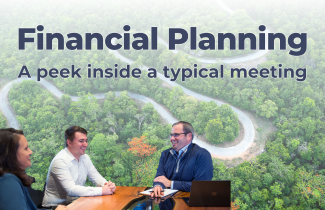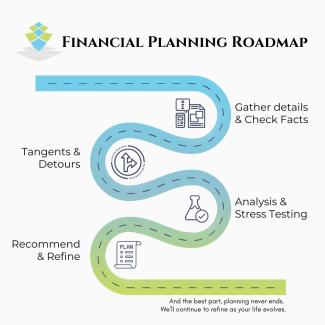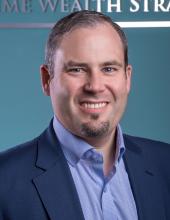
Inside a Financial Planning Meeting
Financial Planning Process
Your finances are valuable. That’s obvious, right?
Something else we know to be true: Your finances have an emotional value.
During the Financial Planning Process, we focus less on the numbers, and more on the feelings around them.
Some people consider an IRA that they inherited from a parent “Mom’s money.” Some people save monthly for their grandkid’s education. Some clients have very specific goals in mind for how they want to face their retirement, and others have goals to simply feel comfortable and confident when they retire.
Each person thinks about their finances differently, each person’s household is set up uniquely, and each client’s relationship with their money is purely individual. The end goal of our Financial Planning Process is to help you have data, projections and strategies for future chapters of your life. We want to add specifics to the abstract. In order to get there, we dive deep into the individual parts of your life.
We describe our Financial Planning Process as a bit of a winding road. Fact gathering is always first, but we’ll take detours and tangents into various topics that pique your interest or are top priority. Jeremy, a CERTIFIED FINANCIAL PLANNER™ on our team, often shares that you have to see the process to understand the value. So, let’s show you a sneak peek, shall we?
An Interview with our CERTIFIED FINANCIAL PLANNER™
Professionals
In the first financial planning meeting, what should clients expect?
A: This is really a get-to-know-you meeting, it’s where, through conversation, we’ll learn about your main concerns, your goals, and begin to understand your personal situation. It’s helpful to bring a summary of your assets, just to begin the fact gathering, but what’s more important are your life details.
What you do for a living, how family plays a role in your life, how you and your family hope to spend future years, what concerns you have about the future or current questions. Even without statements or reports, we can begin to learn a lot about your unique situation through that first conversation.
You mention fact-gathering, what does that consist of?
J: When putting together all of the pieces, we’ll request statements, tax returns, your annual expenses, pay checks, future goals, estate planning documents, it’s a lot.
The goal is two-fold; first, we want to have all of the details to give you the most accurate advice we can. Second, we want to put a second set of eyes on all of the pieces of your puzzle to ensure they’re working how you want.
A: Exactly, Jeremy. We’ve had clients come to the meeting with the assumption that their estate plans were set up one way, but after we reviewed them, we found that that goal wasn’t reflected in the plans. When we say we want the full picture, we really mean it.
Once you have all of my facts, what do you do with it?
J: We build out your plan. We utilize a tool that can help you have all of these details in one place, no matter what bank or advisor they’re with. We’ll then sit down together to walk through the details. We’ll check current facts, like whether your employer matches your 401(k) at 3% or 4%, but we’ll also talk about future assumptions, like how often you typically purchase a car. No two plans are alike, so we spend time making sure those details are all reflected.
Okay, so you have all my details, and it’s in this tool—then what? Am I done?
A: Nope—we’re just getting started. At that point, we’ll be able to show you current projections, but then we’ll talk about those concerns and priorities that we learned about. If you’re worried about what inflation may do to your retirement, we’ll be able to show you actual numbers around those assumptions. We run tests—both positive and negative, to make sure you’re prepared for whatever life may throw at you.
J: We also identify gaps and spend some time understanding your preferences around them. For instance, if you have a concern about needing assistance as you age, there’s several ways to address that concern, so let’s talk about each of those options and make sure you’re educated on them, so then we can decide together which route may be the right fit.
So the planning process includes more than just my investments?
A: Absolutely. We look at tax bracket planning, insurance needs, social security timing, legacy planning, business ownership and more. Your investments are just a piece of your puzzle, we always want to consider the entire puzzle before making any recommendations.
So you get my facts, look for gaps and opportunities, then what?
J: Then we give you recommendations on what, and when, to put those strategies into place. Our goal is for you to leave with a deep understanding of your finances, and how different scenarios may effect it.
A: And we always say, planning never ends. After we’ve completed the process, we’re happy to help you implement any of the solutions, but we also want to revisit your plan annually as life changes.




